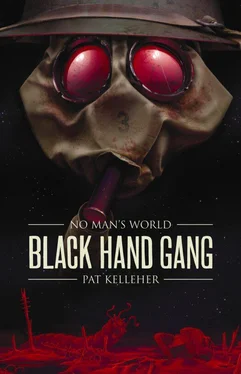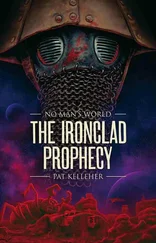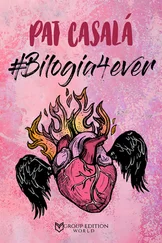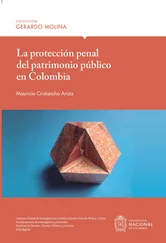“Everson,” he said, “you might have been right.”
“Right?” said Everson quizzically. “About what? What did I say? Jeffries!”
But Jeffries was already strolling down the fire trench, elated.
THE GREAT WORMS, it seemed, had retreated, beaten back by the firepower of the Battalion. The relief along the line was almost tangible. There were exultant, if weary, cheers as the last of the creatures retreated into the earth under the burning glare of another flare.
Slowly the concussive ringing in Atkins’ ears faded to be overwhelmed by the rising tide of groans and screams from those in No Man’s Land.
He plugged his ears with his fingers as if trying to restore the blissful distance granted to him by the explosion, wishing the cries would cease and hating himself for it. The screams continued all night, though none would venture from the trenches to lend aid or succour, the cries gnawing relentlessly at each man’s conscience. Those that could survive out there until morning might have a chance.
Atkins’ guilt threatened to rise up and choke him. Had William died like that, slowly, alone in agony and fear with no one willing to help? If he was truthful even that wasn’t what bothered him. What bothered Atkins was the unspoken thought that somewhere, deep down, he hoped his brother was dead.

CHAPTER EIGHT
“In Different Skies…”
OVER THE NEXT few days a broken telegraph pole was erected to serve as a makeshift flagpole. Hanging from it, not proudly and defiantly, but limply, fluttered a dirty and ragged Union Jack. It seemed to reflect the worn, exhausted mood of the men who wandered aimlessly about beneath it, devoid of any great purpose now the battlefield in which they toiled had ceased to exist. However, the veneer of normality was maintained, as it always was, in the most damning and ignominious of circumstances. Or perhaps because of it, because of the sheer scale of it.
The battalion fell back on a comfortably familiar routine despite their unfamiliar surroundings. The physical labour and variety of the fatigues reassured the men, keeping them occupied and busy. In Kitchener’s Army there was never any shortage of tasks.
Captain Grantham had forbidden anyone to leave the sodden circle of Somme. It was all that now remained for them of the world they knew as home, blighting the fresh green landscape around them like a canker, an unutterably dark stain on their souls, made visible. For Jeffries that wasn’t too far from the truth. Jeffries, who was technically now next in command being a full lieutenant, feeling constrained for the moment by orders he had no compunction to obey, began seeking more signs and portents. The molten rage he felt at the ritual’s failure was, thanks to the sight of the giant worms, even now being forged into cold, hard intent. And he was given to wandering to the far edge of the mud pack and peering out into the unknown land.
It was something many of the other ranks did when not working. Egged on by pals a few daring or stupid ones had tried scrambling down the mud banks onto the verdant foreign plain, wading out into the green tubular fronds and turning to wave at their friends, only to be snatched away with a scream by the hell hounds that still loped about perilously near. That put a stop to such expeditions. Those that didn’t get eaten alive were just as quickly chewed up and spat out by equally voracious NCOs.
Not that many wanted to leave the confines of their claustrophobic muddy trenches, for there, at least, was a sense of familiarity and belonging. There, among the avenues, streets and homes they’d carved and burrowed for themselves they shared a commonality of purpose, of experience, of comradeship that no one back home could, would or should understand. The fear that it might suddenly vanish in an instant, returning to France without them, leaving them stranded, was more than incentive enough to keep most in line. Battle Police and Field Punishments did for the rest.
With the aid of several privates Lieutenant Tulliver wheeled his aeroplane onto the drying mud flat in order to protect it from the indigenous life that seemed to be gaining in courage by the day.
Swamped in his Aid Post, Captain Lippett, with the help of the nurses, began to set up a Casualty Clearing Station on the open ground above, behind the support trenches, using what they could to erect makeshift bivouacs. There they found themselves having to deal with a new kind of shell-shock victim, ones who could not deal with the new reality they now faced.
The tank crew didn’t really fraternise with the other soldiers, preferring to keep themselves to themselves, the secrecy of their training had been drilled into them and was not easily relinquished. They slept in bivvies alongside their machine, politely declining to mix with the others, happy in their own company and in allowing their commander, Mathers, to speak for them. This is not to say they were unfriendly, merely guarded. The landship created a great deal of interest among the infantry men and, when brief moments between work arose, whole platoons would gather round examining the great armoured war beast, circling it and expressing their approval with low whistles and amazed shakes of the head. While pleased with the attention lavished on it, the tank’s crew guarded its secrets enviously, like priests at a shrine, and requests for a ride or a look inside were politely, if firmly, declined.
The length of the day was timed. It came to twenty-two hours. The night sky offered up no clue to their whereabouts, other than it was no sky they recognised. Whatever myths might have drawn its constellations, they were none they knew, so some men began sketching their own; ‘The Pickelhaub’, ‘Charlie Chaplin’, ‘Big Bertha’, ‘Little Willie.’ The brightest star in the night sky was soon named ‘Blighty.’
By day the warm sun began to dry the Somme mud out until it developed a light dry crust that contracted in the heat until it cracked. The decomposing bodies beneath began to rot faster. Foul smelling steams and vapours rose from the flooded shell holes as the fetid liquor within evaporated.
The hell hounds, still drawn by the smell of carcasses, unable to help themselves, slunk forward in ones and twos only to be driven back by sentries’ rifle fire.
2 PLATOON WERE on trench fatigues again, working on the stretch of support trench behind the front line. Meant to house off-duty and support troops it needed to be turned around to work as a front line in order to protect their rear. It was a job they were familiar with. Captured German trenches needed such work doing to them in order to make them defensible; changing parados to parapet, cutting new fire steps and laying new wire. The idea here though was to turn the entrenchment into a circular defensible stronghold. It was still an unnatural feeling to stand in the open on the lip of the trench in the full glare of the sun with nothing to fear but sunburn, but the bright warm sunlight eased their brittle nerves a little.
“Bloody rotten job!” said Mercy, sucking fiercely on the end of a fag as he shoved his entrenching spade into the dirt with his foot, seeking to prise loose another spit-worth of claggy mud.
“I’m sure you’d rather be on burial duty,” said Ketch, walking towards them as they slung the spoil over the top. “It can be arranged.”
Pot Shot put a warning hand on Mercy’s shoulder. Mercy grunted and stubbed the butt of his woodbine out on the damp wall of the trench, grinding it purposefully into the grit, his eyes never leaving Ketch.
“Now put your backs into it! This section of trench is to be finished before dark” he said, before wandering off.
Читать дальше













